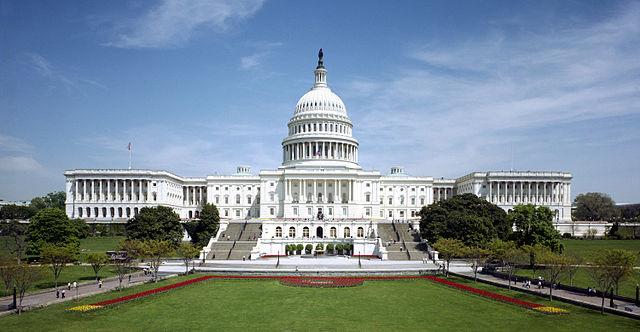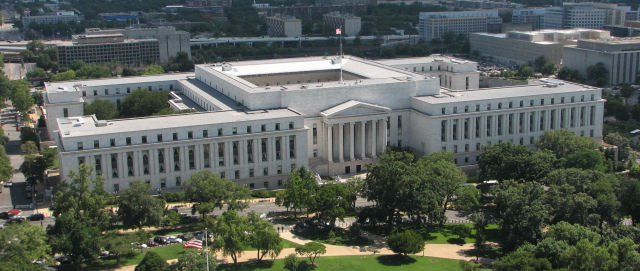Introduction
In summer 2006, I did an internship with the Washington, DC office of my home district's Congressman. This piece describes some interesting aspects of the experience. I won't discuss the details of the office where I worked, since that might violate some document I signed and in any case wouldn't be very professional. Instead I'll mainly discuss general aspects of the intern program and some fun stories.
Contents
Origins
In fall 2005, I realized that I ought to earn to give after college. I began researching high-earning careers, and one interesting possibility was law. I had already been considering a law career because I was inspired by Ralph Nader (a graduate of Harvard Law School) and enjoyed reading technical documents.
I asked for advice on how to prepare for law during the summer after my freshman year of college. One possibility was to enroll in summer law programs, which I applied to, though they were expensive. Another possibility that a friend suggested was to work in some local law offices. I called several law firms in the phone book, but none could offer me an internship. Next I decided to try interning with the state office of my Congressman.  When I interviewed there, the people were quite impressed, but they suggested I might also apply to the Washington, DC office, where more interesting things were going on. So I did that, and was accepted at the DC office too.
When I interviewed there, the people were quite impressed, but they suggested I might also apply to the Washington, DC office, where more interesting things were going on. So I did that, and was accepted at the DC office too.
Just a few weeks before my internship started, I visited DC with the Swarthmore Genocide Intervention Network to lobby for US action on Darfur. One of the offices we tried to visit was that of my Congressman, but it wasn't open when we knocked. During the visit, we did speak with an assistant of a senator, though.
DC housing
When I began my internship, I didn't have a place to stay in DC. Fortunately, a friend offered to let me stay at his house for a bit until I found something permanent. My friend didn't live in the best of neighborhoods, so I was uncomfortable walking to and from the Metro station.
On one Saturday, I thought I locked myself out of my friend's house, which was alarming, since I didn't want to stay outside in that neighborhood for long. I ended up going to the house next door and asking if I could come in there for the time being. The people who answered were reluctant to let me in, but they allowed me to camp out on their porch, and they gave me Guns, Germs, and Steel to read. A few hours later, one of the people in the house where I was staying returned.
In the evenings after work I looked for permanent housing. I ultimately settled on a dorm at Catholic University of America (CUA), since it was cheaper than George Washington University (GW) dorms, though GW was closer to my Metro stop. (I ended up staying in a GW dorm the next summer for my internship with Watson Wyatt.) It turned out that another Swarthmore College student was staying at CUA as well. (And in the Congressional lunch cafeteria, I met yet another Swarthmore student.)
CUA was nice, though it lacked a grocery store nearby. The cafeteria food was unfortunately very pricey. Toward the end of the summer I figured out how to take the Metro to a nearby stop that had a grocery store nearby, but it was still a struggle to haul heavy plastic grocery bags half a mile onto the Metro station and another half mile back to my dorm. I also lacked a refrigerator in my dorm, so I ate mostly vegetables, bread, and canned beans—hoping they'd last long enough in the summer heat.
Congressional buildings
My Congressman's office was in the Rayburn building. Every day I had to pass through security scanners to enter. I wore a professional shirt and shoes in Rayburn, and I brought a coat jacket as well because it was needed to enter the Capitol when giving tours.
The Congressional cafeteria was expensive like the CUA one. There weren't many vegetarian options, so I often ended up with a veggie burger or bean burrito.
Sometimes I got to walk around Congressional offices to make deliveries, and sometimes I did so just for fun during lunch break. I occasionally ran across pages (now no longer used), who interestingly had to dress more formally than I did.
Intern duties
I don't know how much I'm allowed to say about my work, but there appear to be a lot of public accounts of what Congressional interns do in general. For example, here's from Paul Ryan's office:
Assisting with the research and writing of constituent correspondence
Researching issues for legislation
Data assembly and entry into Internet Quorum Government data system
Answering phone calls
Distributing mail and informational materials
Assisting with mailing projects
Greeting constituents and guests of our office
Conducting tours in the Capitol building for constituents
Attending various lectures and classes about the political process
Monitoring floor action
Other projects as assigned
It was daunting to give tours of the Capitol building, since I didn't know that much about it at first, but by the end of the summer I became more comfortable. Sometimes I learned what to say by listening to other tour guides—although some tour guides told stories that we had explicitly learned were apocryphal during our tour-guide training session. On occasion we were allowed to visit the balcony of the Congressional chamber while debate was going on.
This internship was the only job I've ever had where answering phone calls was a regular occurrence. It made snacking a little more difficult, since I had to worry about having a full mouth when someone called. When I was in high school, I dreaded talking on the phone, but I had become more comfortable with it by 2006. Most people who called were friendly. Some were angry and ranted about an issue, until they realized that I was just an intern and then sometimes apologized. A few were genuinely crazy. One time I answered when my mom called in about a legislative issue.
Committee meetings and lunches
Congress had a number of hearings and free-lunch events, and when time permitted, interns were allowed to attend those of interest. Sometimes I took notes, though sometimes the material was over my head. Topics included net neutrality, alcohol consumption during pregnancy, nuclear nonproliferation in the former Soviet Union, avian flu, and tax reform. During one tax hearing, an economist said something like: "One problem with current law is that it's based on economic models for maximizing global welfare rather than US welfare."
One free lunch was sponsored by the Sci-Fi Channel about its "Countdown to Doomsday" film describing 10 ways the world could end. The presentation was intended to provoke serious concern for extinction risks despite having an inevitable veneer of fiction. Ed Lu was there to speak about his B612 Foundation. I went up to him afterward and asked him some altruism-related question.
Other events
There was also an official Congressional Summer Intern Lecture Series featuring prominent public figures speaking to the interns. I attended speeches by John McCain, Dennis Hastert(?), Dennis Kucinich, Ralph Nader, and others. (It was my sixth and last time seeing Nader speak in person.) The lines for these talks were terribly long, and sometimes we waited 30-60 minutes to get good seats. I read Elements of the Theory of Computation while standing in line for one of the talks.
Toward the end of the work day, there were occasionally events in lobbies of Congressional office buildings, sometimes with appetizers.
- One was in support of public television. It featured Sesame Street characters and the real Mr. McFeely in person. I thought about greeting Mr. McFeely and telling him the impact Mister Rogers’ Neighborhood had on me as a child, but I was too shy.
- Another event was about math and science. One of the people with whom I talked was presenting her research on combinatorial optimization. When I told her I was planning to major in math, she said something like "We need more science-literate people in Washington."
Walking home
One time while entering the escalator of the Metro to return home from the office, an Asian woman handed me a newspaper about Falun Gong torture by the Chinese government. I found it really disturbing, and it reinforced my concern for suffering. I kept it for a long time and often thought back to it.
On another day, as I exited Rayburn, I saw Bill Nye talking with two other men on the steps. I didn't want to interrupt them, so I walked past.
White House tour
There was a long queue for White House visits, but eventually my office's interns got their chance to go. We walked through a few rooms, but there wasn't much to see.
Gunshots?
On 26 May 2006, while I was in my Congressman's office, it was announced that someone may have heard gunshots in the Rayburn garage. We were told to stay put, as officers searched room by room to make sure everything was in order. The officers who visited our room were holding guns as they entered. By 3:15 pm, the situation was declared safe, and it was hypothesized that the shots came from an air hammer. All of this is described in news articles from the time, e.g.: "Sources: Capitol 'gunfire' likely from air hammer".
As I left for home that afternoon, stepping out of Rayburn onto the sidewalk, I saw a camera crew ahead of me. It was two people from CNN: a male with a camera and a female with a microphone. Apparently I was one of the first people to leave the building after the lockdown, and the CNN woman asked if she could interview me about the day's events. I declined because I was shy, but had I taken up the offer, I probably would have been on national television.
Outside of work
Most of my free time I spent reading, working on math problems, creating a website of my altruistic essays, and writing a paper about wild-animal suffering.
An Inconvenient Truth was a sensation at the time, so I saw it with a friend from Swarthmore. I also visited the GI-Net offices and had dinner with some conservative Christians who advocated virtue ethics.
Pay
The internship paid ~$1500/month. You can find a website with my salary information by searching {brian tomasik congressional salary}, though you have to pay to access the data.
Later visits to DC
In Jan. 2007, I did a week-long externship involving accounting. It was at the headquarters of the American Board for Certification of Teacher Excellence, so by coincidence, I ended up returning to DC for that. Then in summer 2007, I interned with Watson Wyatt in Virginia, but I lived in DC during that internship.